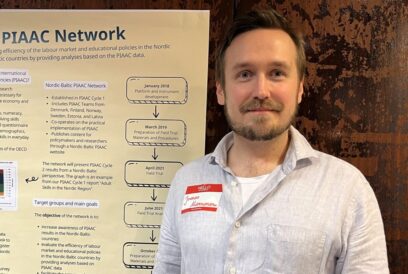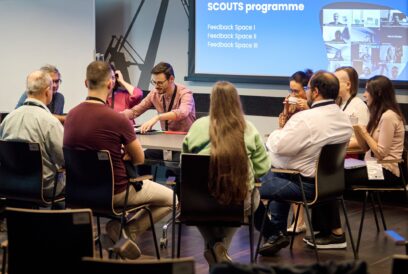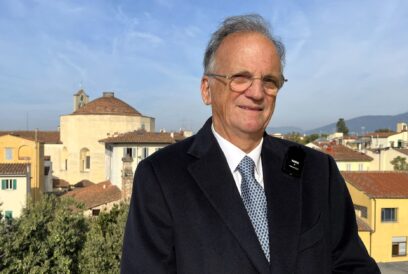

In the "Knowledge Volunteers" project seniors were taught ICT skills by young peers. The low-threshold human contact alleviated “techno-fear” for the older learners.

Introduction – Project aims and collaborators
The Knowledge Volunteers” (TKV) project tackles the risk of exclusion of the growing ageing population and the gap between generations, through ICT and intergenerational learning methodology.
TKV encourages the debate on the exclusion of the older generation, and at the same time raises awareness and concretely contributes to the recognition of how the elderly can contribute actively to society using digital competences.
The project has been developed and coordinated by Fondazione Mondo Digitale, an Italian NGO, together with the University of Edinburgh and five organisations based in Europe and specialised in adult learning and volunteering: 50plus Hellas (Greece) Societatea Romana Pentru Educatie Permanenta (Romania), Foundaciòn Para el Desarollo Infotecnologico de Empresas (Spain), Centrum vizualizace a interaktivity vzdelávání Ostrava (Czech Republic) and International Communication Volunteers – ICVolunteers (Switzerland). The project is funded by the European Commission’s Grundtvig Programme.
Isolated seniors
The isolation of older people is a challenging issue in the Italian society as well as in all the countries involved in the project, as witnessed by the interview data collected for the project evaluation.
Floriana, one of the Italian teachers participating in the project remarks about the need for socialization opportunities among older people:
“Older people have a big need to communicate and socialize […] Most of them are lonely people. Their relatives are out of the city or out of country. So they [the elderly] have the opportunity to communicate with them, efficiently and free of charge”, referring to ICT, also suggesting that this problem may come from an old common habit (perhaps also related to the previous totalitarian regime):
“They are not used to going out of their houses and do things together, because this is the way they have grown in the past years”.
Living in isolation, without contacts with the world outside apart from the contact resulting from daily necessities (house work, shopping etc.), means leading a very non-stimulating life.
Discovering the digital world
During 2 years of activities implementation, from October 2011 to September 2013, TKV raised awareness and changed elders’attitude in using the PC, realising the enhancement of the digital competences of more than 1000 elders in 5 European countries. In practice this was achieved through the digital literacy training courses the project has been providing, including four levels of classes, from ABC of ICT to social networking, easy technology and e-government services that allowed elders to become able to communicate with friends and families worldwide, to search on line for information about what to do in their free time or to book a medical reservation via the web.
The Evaluation Report of the first year of training courses, published recently by Fondazione Mondo Digitale and University of Edinburgh, demonstrates that most of the seniors enrolled in the courses had few or limited knowledge about the PC and found difficulties in understanding and remembering basic subjects as to how the PC or the Internet work.
In all the countries, the elderly participants improved their PC skills after they completed the course programme. See tables 1 to 3 below for more details.
As a result of their experience within the project, participants declared they will continue practicing with the PC after the end of the courses, in some cases using a friend’s PC or going to libraries or a social centre. Some of them will enrol in other courses and purchase a personal computer to exercise and use the Internet to remain informed.
Table 1

Table 2

Table 3

Volunteers as pedagogues
Intergenerational learning methodology has been the innovative key that allowed project partners to reach such results.
Training courses were organised in cooperation with elder centers, schools and universities of the third age. Training was provided to school teachers to allow them to organise the courses and enrol young students from the school as tutors. Young volunteers of all ages, from 8 to 25, tutored older learners peer to peer, teaching them how to use the Internet and the PC. The youngest tutor was only 8 years old but was able to guide her grandparent in how to use the social networks on the net.
Tutors were themselves trained before the beginning of the courses and in some cases they prepared the lessons for the elder students themselves, personalising exercises and didactic materials based on the learning needs and difficulties observed during the courses.
Generally each course was composed of 10 to 20 lessons of 1 to 2 hours, organised in both frontal lessons and practice, based on the learning programme curricula and didactic kit developed within the project. Sitting side by side with his/her tutor and practicing the use of the PC, each senior tackled the learning programme’s 4 levels of knowledge: ABC of ICT, Social Networking, Easy Technology and E-government services.

University of Ostrava, Czech Republic, Pyramida Centre for students with special needs: after completing the project ICT course, elder learners have been able to teach each other how to use the PC.
Photo: TKV
The seniors: “I can do something I thought I couldn’t.”
Intergenerational exchange and relations with young people encouraged the elders to learn about using ICT to communicate, stay informed, be autonomous using health services and promoted their active participation in society enhancing their self-esteem.
The older learners judged the overall experience positively and were glad about the opportunity to socialise and meet new friends from the younger and the older generation alike. They declared the experience gave them the feeling they can actively and fully participate in their community exactly as their younger new friends do.

Socrate high school, Rome, Italy: a young volunteer teaching an elder learner how to use skype.
Photo:TKV
Konstantinos enrolled in one of the courses in Greece and during the interview at the end of lesson said:
“A fantastic experience, a really humane experience. A very friendly environment at the City College, the coordinator was friendly, as was my tutor. All the children were good, that is why I named them children in brackets. The knowledge that I gained was actually a lot more than I expected”.
Marie, who frequented the courses in Czech Republic said:
“Each course brings something new. With each course I’m becoming more confident working with a PC. I learned how to use facebook (I use it on a very little time-consuming basis), internet banking (I still don’t have the courage to start it). Sometimes I try shopping in online stores. Otherwise, I just look for information on the Internet. We learned how to use smartphones, tablets, etc. I would certainly sign up for any similar course.”
Evald, interviewed during a course in Czech Republic said:
“I consider the intergenerational relationships to be positive because both the trainers and teachers are very helpful and most have been very patient with us and are always willing to explain problems that arise.”
Maria Pilar, a grandmother frequenting the courses in Spain declared:
“The most important thing I am learning is that I’ve realized that I can do something I always thought that I would not be able”.
Internet surfing and immediate availability of information are among the topics that encourage more curiosity and eagerness to learn. The fact the students have a tutor beside them helps them to forget the computer as a piece of equipment. They directly pay attention to the contents and the information.

At The American College of Greece- PIERCE in Athens, a tutor and a learner congratulate each other for results obtained together.
Photo: TKV
Volunteers: “You learn about your own capacities.”
The volunteering experience as teachers and tutors was also deemed extremely valuable. It helped young students to strengthen their motivation to participate actively in cooperative work and enhanced their personal and social responsibility.
As a young tutor from Greece noted:
“… I was expecting it to be boring, but it was not so. You were never bored. You did not notice the age difference and it was very interesting.”
Another tutor expressed how the tutors respected the older learners for still wanting to learn even in an advanced age:
“…it is a great experience to teach people who have actually learnt a lot. So it is nice to know that you can have a kind of respect of these people even though they lack experience in a certain area.”
Carmen, a 15-year-old volunteer at the Colegio Paraiso in Madrid said:
“This is a very beautiful experience, I am learning a lot, not only helping people to learn but also learning myself with them”.

Colegio Paraiso Sagrados Corazones, Madrid, Spain: a young volunteer teaching peer to peer to an elder learner how to write an email.
Photo: TKV
Samoila, who tutored elder learners in Italy says:
“Being tutor means to really know how the computer works, in order to be able to teach, and this experience leads to understanding … your [own] capacities and skills.”
Cross-sector participation enabled success
More than 500 youths of all ages participated in the project activities and more than 800 elders took a course. All the students, teachers and seniors who took part in the project, said they would recommend the experience to their friends and colleagues.
The courses curricula and training model is replicable in similar contexts where schools, elders centers, social centers or universities of the third age, are willing to participate.
The project experience highlighted that older learners’ learning difficulties can be addressed thanks to patience and practice.
A potential pitfall is a lack of cooperation between stakeholders or lack of adequate equipped spaces. This can affect the courses’ effective implementation. Furthermore, as most of the course organizers noted:
“…the involvement of computer or other software companies would bring a lot of easiness in organizing the whole course”.
The didactic kit represents the guide tool for organisations, schools, training centers willing to replicate the project experience. The kit is composed of Guidelines for Tutors, Teachers and Grandparents and of four Handbooks for ABC of ICT, Social Networking, Easy Technology and E-government services corresponding to the four levels of courses. It has been developed during the project, adapting the contents continuously to respond to the needs and constraints of the learners. The kit has been a fundamental tool for the courses’ implementation, providing information and example for the organisation of the learning programme and being source of exercises and text for self learning. It is available for free download under Creative Commons Licence in English, Italian, Spanish, Greek, Romanian, and Czech. It can be used both for self-training material by adult or young learners and as supporting materials during formal or non-formal lifelong learning programmes and most of all can be used to support the implementation of digital literacy courses based on intergenerational exchange teaching and learning methodology, addressing different disadvantaged categories.
This article was produced in collaboration with InfoNet adult education network.
Good practices of the project
-Volunteers of all ages as teachers: good, informal atmosphere
-A learning process for seniors and volunteers alike. Teaching others leads to self-knowledge and appraisal of one’s own skills
-The low-threshold human contact erased fear of technology for the seniors
-Broad base for collaboration ensures broad outreach and needed physical equipment: schools, elders centers, social centers and universities of the third age
-Project resources could have been improved by securing a computer/software company as a sponsor.







